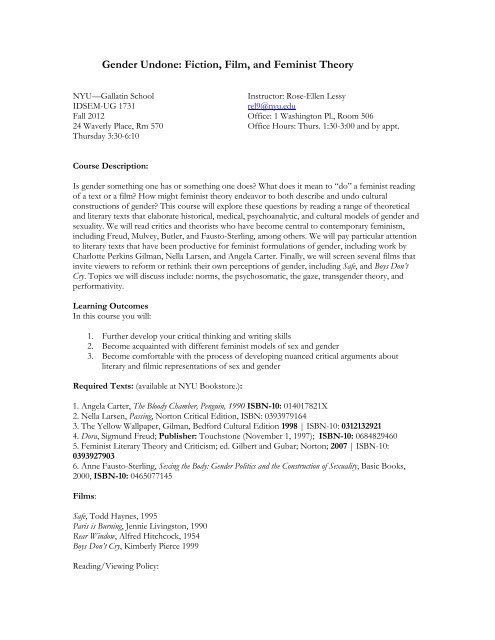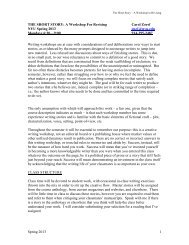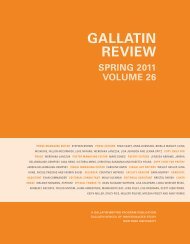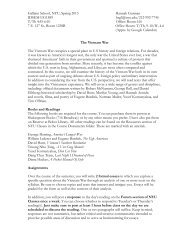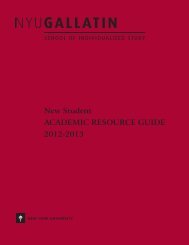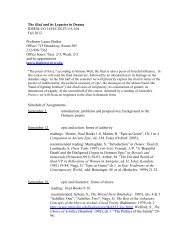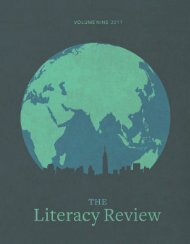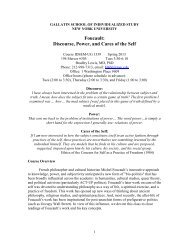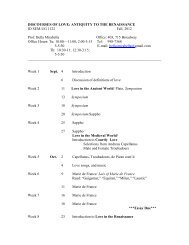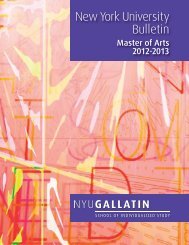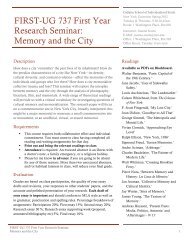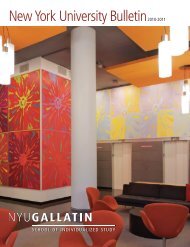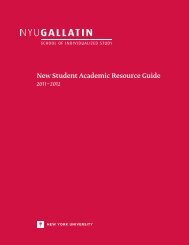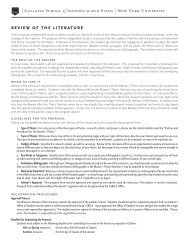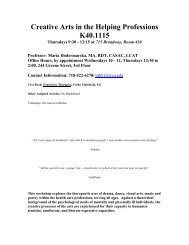Gender Undone - Gallatin School of Individualized Study - New York ...
Gender Undone - Gallatin School of Individualized Study - New York ...
Gender Undone - Gallatin School of Individualized Study - New York ...
You also want an ePaper? Increase the reach of your titles
YUMPU automatically turns print PDFs into web optimized ePapers that Google loves.
<strong>Gender</strong> <strong>Undone</strong>: Fiction, Film, and Feminist TheoryNYU—<strong>Gallatin</strong> <strong>School</strong>Instructor: Rose-Ellen LessyIDSEM-UG 1731rel9@nyu.eduFall 2012 Office: 1 Washington Pl., Room 50624 Waverly Place, Rm 570 Office Hours: Thurs. 1:30-3:00 and by appt.Thursday 3:30-6:10Course Description:Is gender something one has or something one does? What does it mean to “do” a feminist reading<strong>of</strong> a text or a film? How might feminist theory endeavor to both describe and undo culturalconstructions <strong>of</strong> gender? This course will explore these questions by reading a range <strong>of</strong> theoreticaland literary texts that elaborate historical, medical, psychoanalytic, and cultural models <strong>of</strong> gender andsexuality. We will read critics and theorists who have become central to contemporary feminism,including Freud, Mulvey, Butler, and Fausto-Sterling, among others. We will pay particular attentionto literary texts that have been productive for feminist formulations <strong>of</strong> gender, including work byCharlotte Perkins Gilman, Nella Larsen, and Angela Carter. Finally, we will screen several films thatinvite viewers to reform or rethink their own perceptions <strong>of</strong> gender, including Safe, and Boys Don’tCry. Topics we will discuss include: norms, the psychosomatic, the gaze, transgender theory, andperformativity.Learning OutcomesIn this course you will:1. Further develop your critical thinking and writing skills2. Become acquainted with different feminist models <strong>of</strong> sex and gender3. Become comfortable with the process <strong>of</strong> developing nuanced critical arguments aboutliterary and filmic representations <strong>of</strong> sex and genderRequired Texts: (available at NYU Bookstore.):1. Angela Carter, The Bloody Chamber, Penguin, 1990 ISBN-10: 014017821X2. Nella Larsen, Passing, Norton Critical Edition, ISBN: 03939791643. The Yellow Wallpaper, Gilman, Bedford Cultural Edition 1998 | ISBN-10: 03121329214. Dora, Sigmund Freud; Publisher: Touchstone (November 1, 1997); ISBN-10: 06848294605. Feminist Literary Theory and Criticism; ed. Gilbert and Gubar; Norton; 2007 | ISBN-10:03939279036. Anne Fausto-Sterling, Sexing the Body: <strong>Gender</strong> Politics and the Construction <strong>of</strong> Sexuality, Basic Books,2000, ISBN-10: 0465077145Films:Safe, Todd Haynes, 1995Paris is Burning, Jennie Livingston, 1990Rear Window, Alfred Hitchcock, 1954Boys Don’t Cry, Kimberly Pierce 1999Reading/Viewing Policy:
Grading:While the grades you receive on papers will figure most prominently in the determination <strong>of</strong>your final grade (80%), the following factors will also matter:Class attendance: absences will hurt your grade.Class participation: being present in body alone is insufficient to merit the termparticipation. You need to contribute in productive and visible ways.Class preparation: presence, even highly vocal presence, is not particularly helpful if youhave not done the required reading. Please come to class prepared to discuss theassigned readings and screening.Paper Formatting:Conferences:All papers must be typed, double-spaced, page-numbered, and stapled or paper-clipped.Papers lacking these features will not be accepted.No funny business with fonts and margins. Please use one-inch margins and standardfonts in eleven- or twelve-point.Always choose a title, but skip the title page. Place all information (name, date, course,assignment) in the upper right-hand corner <strong>of</strong> your first page.Please use MLA citation formatI will have weekly <strong>of</strong>fice hours: use them! If you are unable to attend <strong>of</strong>fice hours but wouldlike to meet, please speak to me about setting up an alternative time.Academic Integrity:As a <strong>Gallatin</strong> student you belong to an interdisciplinary community <strong>of</strong> artists and scholarswho value honest and open intellectual inquiry. This relationship depends on mutual respect,responsibility, and integrity. Failure to uphold these values will be subject to severe sanction,which may include dismissal from the University. Examples <strong>of</strong> behaviors that compromisethe academic integrity <strong>of</strong> the <strong>Gallatin</strong> <strong>School</strong> include plagiarism, illicit collaboration,doubling or recycling coursework, and cheating. Please consult the <strong>Gallatin</strong> Bulletin or<strong>Gallatin</strong> website [www.gallatin.nyu.edu/academics/policies/policy/integrity.html] for a fulldescription <strong>of</strong> the academic integrity policy.Plagiarism, or academic theft, is claiming someone else’s work as your own. Please consultme if you have any questions about what constitutes plagiarism. To avoid even theappearance <strong>of</strong> plagiarism, please make sure to cite every source you cite—this includes everyonline source. Please consult a guide like A Writer’s Reference for guidelines on thedocumentation <strong>of</strong> online sources.Cell Phone/Laptop Policy:Of course, you must turn <strong>of</strong>f cellular phones before coming to class. If you bring a laptop,please do not turn it on or use it during class time. (I may make exceptions for viewingcourse readings on laptops, depending on the week.)Disabilities Policy:
<strong>New</strong> <strong>York</strong> University is committed to providing equal educational opportunity and participation forstudents with disabilities. It is the University’s policy that no qualified student with a disability beexcluded from participating in any University program or activity, denied the benefits <strong>of</strong> anyUniversity program or activity, or otherwise subjected to discrimination with regard to any Universityprogram or activity. The Henry and Lucy Moses Center for Students with Disabilities (CSD)determines qualified disability status and assists students in obtaining appropriate accommodationsand services. Please contact the CSD at 726 Broadway, 2nd Floor (Phone: 212-998-4980; Email:mosescsd@nyu.ed) if you have any questions.Schedule:Part I: What is gender? What are women?Week 1September 6:IntroductionAngela Carter “The Werewolf”* Diagnostic essay (0%)Week 2September 13: What is gender? Social construction accounts1. Simone de Beauvoir from The Second Sex (FLTC 299-323)2. Joan Scott, “<strong>Gender</strong>: A Useful Category <strong>of</strong> Historical Analysis” (Blackboard);3. Monique Wittig from One is Not Born a Woman (FLTC 545-551)Week 3September 20: What are women?1. Sherry Ortner “Is Female to Male as Nature is to Culture?” (FLTC 350-367),2. Denise Riley from Am I That Name? (Blackboard)3. Chandra Mohanty (FLTC 824-833)Part II: Feminist reading, Feminist WritingWeek 4September 27: What is a feminist reading?1. Judith Fetterly, (FLTC 443-448)2. Jonathan Culler “Reading as a Woman” (Blackboard)3. Barbara Christian, “The Race for Theory” (Blackboard)4. Gayatri Spivak, “Three Women’s Texts and a Critique <strong>of</strong> Imperialism” (FLTC 900-904)Week 5October 4: What is feminist writing?1. 1.Audre Lorde (selections in FLTC 222-228 and on Blackboard)2. Angela Carter, The Bloody Chamber**Essay #1 DuePart III: The SymptomWeek 6October 11: Reading the symptom1. 1.Sigmund Freud, Dora2. 2.Charlotte Perkins Gilman “The Yellow Wallpaper”
Week 7October 18:1. 1.Safe (Watch prior to today’s class meeting)2. 2.Barbara Johnson “Is Female to Male as ground is to Figure?”Part IV: Performing <strong>Gender</strong>Week 8October 25: What is gender again (and again)?1. Judith Butler, “Imitation and <strong>Gender</strong> Insubordination” (FLTC 708-723);2. Butler, from Bodies that Matter (blackboard);3. Paris is Burning (Watch prior to today’s class meeting)LookingWeek 9November 1:Nella Larsen, Passing (1-83) and critical essays by Carla Kaplan (ix-xxvii) Deborah McDowell (363-379) and Jennifer Brody (393-309)Week 10November 8:1. Laura Mulvey “Visual Pleasure and Narrative Cinema”2. Watch Rear Window in class**Essay #2 DueWeek 11November 15:1. Marita Sturken and Lisa Cartwright from Practices <strong>of</strong> Looking (Blackboard)2. Tania Modleski “The Master’s Dollhouse: Rear Window” (Blackboard)3. Mary Ann Doane “Film and the Masquerade: Theorizing the Female Spectator”4. bell hooks “The Oppositional Gaze: Black Female Spectators” (Blackboard)Week 12November 22: Thanksgiving RecessIV. Rethinking embodimentWeek 13November 29: Questioning sex/gender – Anne Fausto-Sterling, Sexing the Body (text)Week 14December 6:1. Boys Don’t Cry (Watch prior to today’s class meeting)2. Judith Halberstam “The Transgender Look” (blackboard);3. Judith Butler, from Undoing <strong>Gender</strong> (Blackboard)Week 15December 13: Conclusions.**Essay #3 due.


